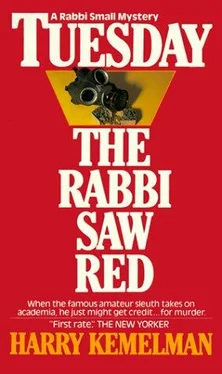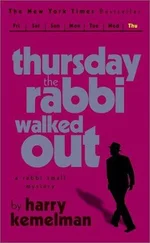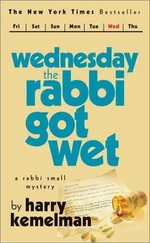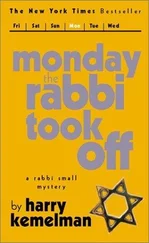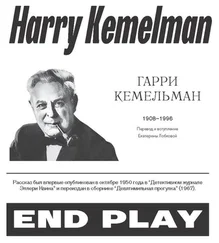"I did?"
"Why sure. In her statement, the dean didn't say anything about phoning Hendryx and asking him to hang around."
"And how is that important?" asked Lanigan, interested.
"Well, say she was involved." He looked from one to the other, the rabbi's lips were pursed in doubt; Lanigan was smiling. "I mean—" Then Schroeder surrendered completely and laughed. "Sorry. Rabbi, but I guess I was still a little sore because you wouldn't see me last night," he said sheepishly. "So after you left on Friday, did you see anyone at all, on your way out?"
"Well, the door of the dean's office was closing as I came down the hall, so although I didn't exactly see her I assume she was in her office, and then downstairs I saw Professor Fine in the English office, he said he was waiting for a phone call."
"What time did you get home. Rabbi?" asked Schroeder.
"It was quite late." the rabbi admitted. "About half-past three."
Lanigan raised his eyebrows. "Have trouble on the road?"
"No, I stopped for a cup of coffee."
"That shouldn't have taken long," said Schroeder. "Well, it was one of those places where you eat in your own car." the rabbi explained. "I began reading a book and must have lost track of the time." When they left. Schroeder asked. "What do you think of your friend's story?"
"You don't know him." said Lanigan. "I assure you it's completely in character."
"Still..."
"Look. Sergeant, there never was an investigation without its little inconsistencies, and the quickest way to get bogged down is to concentrate on them instead of the main line. But I guess you know that better than I."
"Yeah." said Schroeder. "but sometimes you can't help being bothered by them. For example, why didn't the dean tell me she'd phoned Hendryx and asked him to stand by?"
"You find that hard to understand?" asked Lanigan. "She didn't tell you because she forgot, and she forgot because she wanted to forget, and she wanted to forget because otherwise it would mean that she was responsible for his death."
The Sunday morning minyan was usually well attended. For one thing, it was held an hour and a half later than on weekdays—nine instead of seven-thirty— for another, it was followed by a meeting of the board of directors at ten, so most of them came early and participated in the twenty-minute service
.Although Malcolm Selzer rarely attended the weekday minyan — he was already in the warehouse at seven-thirty— he never missed the one on Sunday, he was one of the handful with a traditional upbringing who knew the liturgy and often was asked to lead the prayers. But this Sunday he did not show up. His absence did not pass unnoticed.
Although the name was reported variously as Abner Seldar, Adam Sellers, and Aaron Selger, no one in Barnard's Crossing, certainly no one in the Jewish community, had any doubt that the person referred to in the newspaper accounts of the bombing was Malcolm Selzer's boy, Abner, and the somewhat larger attendance at the minyan that Sunday was no doubt due in part to the quite human desire for more information.
The late Saturday night broadcast and the Sunday papers had provided a somewhat fuller account: that the dean. Millicent Hanbury, had met with a student delegation to discuss student grievances; that she had left the meeting— reason not given; that shortly afterward the committee of five had left her office and the building; that less than five minutes later the bomb had gone off, the district attorney's office had issued a statement saying it was planning to question each of the students
As the men were folding up their prayer shawls. Dr. Malitz, one of the older men, remarked, "He was too embarrassed to come. I suppose."Dr. Greenwood, a dentist like Malitz, shook his head. "Why does it have to be a Jewish boy?"
"What do you mean a Jewish boy?" said Norman Phillips indignantly. "There were five of them and the Selzer kid was the only one who was Jewish, and what's being Jewish got to do with it? He's an American, isn't he? He got the same rights as anybody else, hasn't he?"
Dr. Malitz came to the defense of his fellow dentist, he was a periodontist and Greenwood sent him patients. "You see in the papers that someone with a Jewish name has made some scientific discovery — you know, has done something good— you feel kind of proud it was one of ours, don't you? We all do. So naturally when one of us sees something not so nice, we feel—"
"You feel guilty. Right? Well, I don't; said Phillips stoutly. "I feel that as an American citizen I got just as much rights as any other citizen, and that means I'm no more responsible for what someone named Cohen or Levy does than I am for someone named Cabot or Lodge. Naturally, I'm sorry for Mai Selzer, but you know, in a way he was asking for it."
Greenwood stared. "What kind of crack is that? What father deserves to see his son in trouble?"
"Well look, my kid goes to college. Rensselaer Polytech. Doc Malitz here has a boy in college. I don't know about your boy, Doc, but I know my kid acts up a little now and then, he's kid, see. Last year, for example, they had a riot at his school, the cops turn up, reporters, the works. My kid says he was just looking on, you know, watching the fun, maybe he was; maybe he wasn't. I'm not one of those fathers that thinks their kid can't do no wrong, anyway, he gets pinched and he spends the night in jail and he has to pay a fine, he? Me. I had to pay it."
"So?"
"So my point is, did I go around bragging how my kid was a big student leader?"
"So you brag about something else that your boy did, maybe that he got into Rensselaer."
"I just mentioned that because—"
"Makes no difference." said Greenwood. "Fathers brag about their children. I'm sure Malcolm Selzer would rather brag that his boy was getting high marks and scholarships."
Dr. Malitz had a sudden thought. "How do we even know the Selzer boy had anything to do with the bombing? All the paper said was he was one of those at the meeting and the D.A, was planning to question him."
"When the D.A, questions somebody, like as not he ends up in jail." said Phillips. "What I'd like to know,” he went on. "is what the rabbi knows about it, he teaches there. I notice he didn't come today, either."
"He's the guest speaker at the men's bible study class at the Lynn Methodist church this morning." said Dr. Malitz. "There was a notice in the Lynn paper."
"Just our luck." said Phillips disgustedly. "So that means they'll get the inside dope, not us."
The rabbi arrived home shortly before noon to find an impatient Malcolm Selzer waiting for him. "Your wife said you'd be along any minute,” he said. "Besides, my wife was so sure you'd be able to do something I didn't have the heart to tell her I'd missed you."
"Just calm down. Mr. Selzer, and tell me what's on your mind."Selzer looked at him gratefully, then took the seat the rabbi offered. "Well, Friday I heard the news same as everybody did, and I'll admit I had this little funny feeling maybe my Abner might be mixed up in it." He held up a hand. "I don't mean that I thought he could do anything like a bombing, a thing like that. I know my boy, he wouldn't hurt a fly. But I thought maybe he knows about it, maybe some group he could be connected with— You know how you think, how all kinds of funny ideas can come into your head?"
"Of course. Take your time and tell me what happened." Selzer nodded. "All day Saturday, I thought of calling Abner. You know, not asking him point-blank, but just how's tricks, what's new, that way, if he was involved he could say something. It wasn't so much me as my wife who kept nagging me. 'Call him up; you got a son; talk to him once in a while.' And to tell the truth, I would have, except I was afraid it was like asking for it. My mother, may she rest in peace, always used to say, 'Don't start anything,'"
Читать дальше
